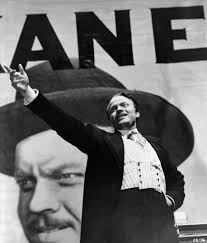Citizen Kane: the Journey of Reminiscent Self Discovery

Fade in, start the scene. Enter an ominous spectral vestige… “Rosebud” a voice melancholily whispers. A modicum of theatricality in an iota of time. Thirty-seven seconds and you’re replete with curiosity. Citizen Kane—undisputedly the greatest movie of all time—is mercurial and ambiguous. Poignant yet cryptic. Consequential however enigmatic. No combination of words can be put on a page that can quite capture the nature of this film; however, why should you watch a movie that cannot be perfectly encapsulated into worthy words?
A laudable question worthy of an answer; however the only true answer is why have you not watched this cinematic masterpiece yet? Everyone—from cinefiles to the casual viewer—should indulge in this masterpiece which may teach you more about the futility of excessive wealth, the dichotomy of wealth and happiness, as well as the importance of childhood. Citizen Kane may not only give you a pleasurable viewing, but it may in fact make the careful viewer a better person. Citizen Kane comes from an era of substandard quality, but is a pioneer in cinematography, boasting some of the most influential performances of the twentieth-century. Orson Welles, Ruth Harwick, and Joseph Cotten all deliver substantially impressive performances that shape the world of acting even today.
Every movie fan and even those accustomed to Netflix viewings should seek out a copy of Citizen Kane and indulge themselves with a cinematic masterpiece. The performances, cinematography, and even the editing techniques have not only changed the face of the movie industry but impacted the thespians of future generations as well as being one of the most well crafted movies ever forged by the intuition of a great artist and writer.

Aidan—Dadcliffe—Radcliffe is a senior at Bethpage High School, and returning to journalism for his second year. In his free time he rewatches...










